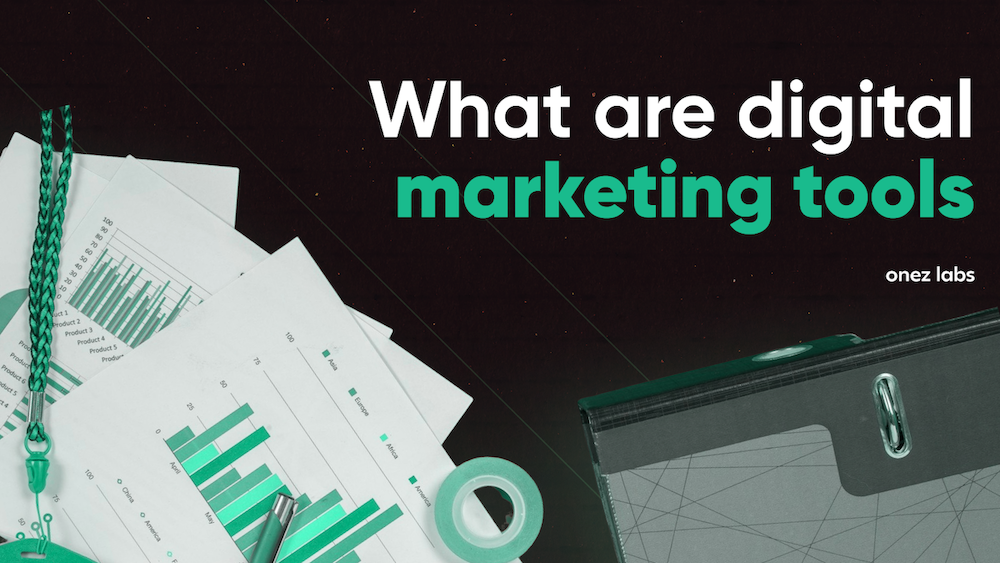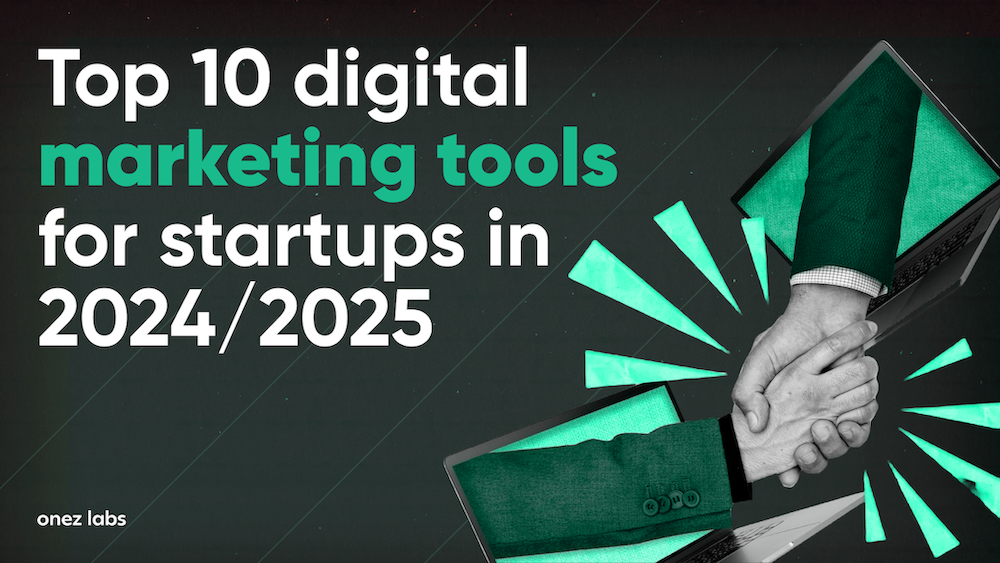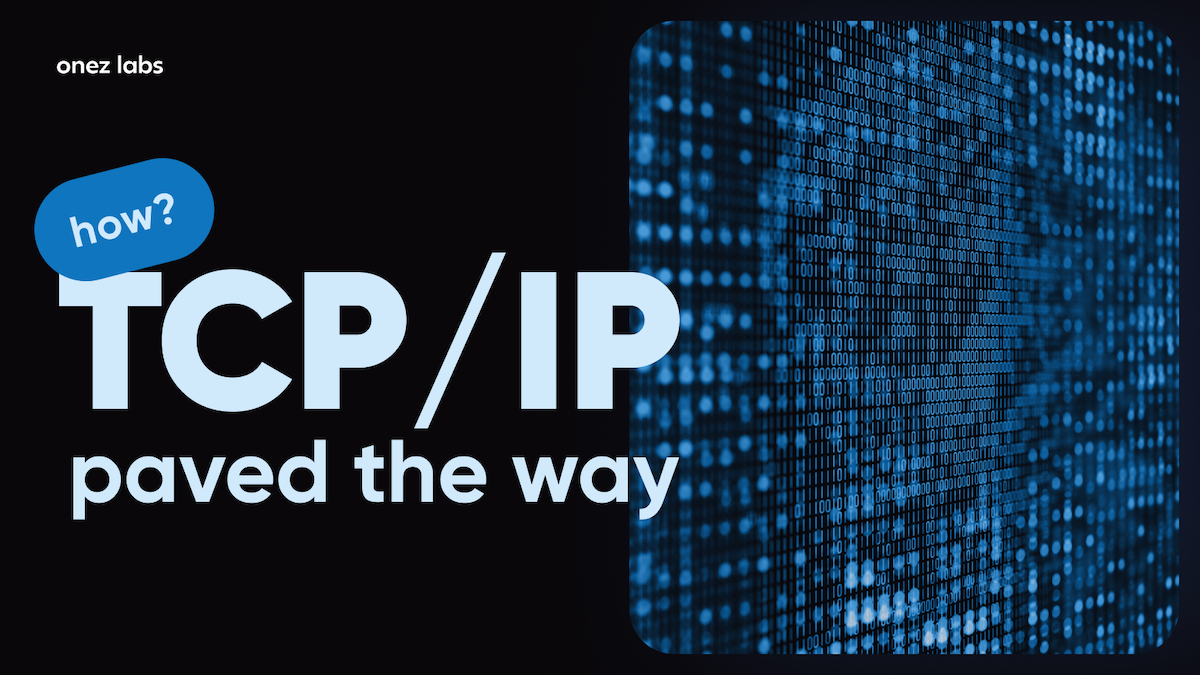Table of Contents
- Digital tools that give startups Amazon’s edge — Without a big team or budget
- What are digital marketing tools?
- Criteria for choosing a digital marketing tools
- Top 10 digital marketing tools for startups in 2024/2025
- Closing thoughts
Digital tools that give startups Amazon’s edge — Without a big team or budget
Back in the early days of the internet, marketing was a whole different thing. Businesses had to rely on gut feelings, word of mouth, and old-school advertising to reach customers. But as technology evolved, so did the tools available to marketers. Nowadays, we’re living in a world where digital marketing is king, with all sorts of fancy tools designed to help startups and small businesses stand out in a crowded market.
For new businesses, digital marketing tools are no longer just a nice-to-have—they’re a must. These tools make marketing easier, help target specific audiences, and give businesses insights into their customers that were unheard of in the past. Now, you can track customer behavior in real-time, predict trends using data analytics, and even send out personalized messages that really hit home—all with just a few clicks. It’s all about using technology to make marketing more efficient and effective.
But with so many tools out there promising to revolutionize your marketing, how do you know which ones are right for your business? In this article, we’ll break down the top digital marketing tools for 2024/2025. We’ll focus on tools that have a proven track record of driving growth, improving analytics, and boosting customer engagement. Whether you’re a startup founder, a small business owner, or a marketing pro, this guide will help you choose the best tools to create a killer marketing strategy.
Key takeaways
- Digital marketing tools are a must-have for startups. They help make marketing efforts more effective and efficient by streamlining tasks, targeting specific audiences, and providing insights into customer behaviors.
- Cost-Effectiveness and Scalability. These tools are not just a luxury but a necessity for new businesses. They offer a cost-effective way to compete in the digital marketplace and can replace the need for large teams and expensive advertising methods. Plus, they are scalable, so startups can grow their marketing efforts as their business expands.
- Key Criteria for Choosing Tools. When choosing digital marketing tools, startups should look for ones that are easy to use, affordable, scalable, and integrable with existing software. Good customer support is also important for navigating any learning curves, especially in a startup environment.
- Top Tools Drive Growth and Efficiency. Top tools like HubSpot, Mailchimp, Google Analytics 4, Canva and MarTech, are essential for CRM, email marketing, analytics, and design. By automating and optimizing these areas, startups can reach customers more effectively and build stronger relationships.
- Using data-driven decision-making is key for startups. Modern digital marketing tools empower them to make informed decisions based on data, helping them stay agile and responsive to customer needs. This approach gives even small businesses the competitive edge needed for sustainable growth.
What are digital marketing tools?

Digital marketing tools comprise a comprehensive suite of technologies, platforms, and software solutions designed to enhance and optimize your online marketing efforts. These tools help you create awesome content, share it with your audience, and see how well it’s performing. They also help you make smart decisions based on data.
Some of the main types of digital marketing tools include:
- Analytics and performance tracking (like Google Analytics)
- Content management and creation (like WordPress)
- Social media management (like Hootsuite)
- Email marketing automation (like Mailchimp)
- Search engine optimization (SEO) and search engine marketing (SEM) (like SEMrush)
So, if you want to take your online marketing strategies to the next level, these tools are definitely worth checking out!
Why startups need digital marketing tools:
Digital marketing tools are essential for startups looking to achieve high-velocity growth with limited resources. These tools not only automate repetitive tasks but also allow for data-driven decisions that can strengthen customer relationships and increase ROI. They help analyze customer behaviors and manage multi-channel campaigns very effectively.
MarTech tools are designed to deliver maximum impact with minimal costs, particularly for startups competing in today’s digital market.
MarTech tools have changed the narrative for startups because they help save money. Traditional marketing methods can be super expensive, but digital tools allow small businesses to do a lot more without breaking the bank. By automating stuff like social media posts, email marketing, and customer segmentation, these tools mean you don’t need a huge team. That frees up resources that can be used to promote your business further. Plus, being able to see how your campaigns are doing in real-time lets you tweak things quickly for better results, making sure you’re getting the most bang for your buck.
But it’s not just about saving resources- it’s also about being able to scale alongside your project. With MarTech, startups can run campaigns that can keep up with their business as it expands. Tools that help target customers automatically and send personalized messages mean small businesses can keep customers interested even as they expand.
So, if you’re a startup looking to make a name for yourself, digital marketing tools like MarTech are the way to go. They’ll help you create marketing strategies that are efficient, scalable, and focused on data, so you can see real results.
Criteria for choosing a digital marketing tools
Choosing the “best digital marketing tools” for your startup is a step toward building a successful marketing strategy. With countless options available, it’s important to focus on tools that align with your business goals and can grow with you. Here are a few key criteria to keep in mind when evaluating “Digital marketing tools” for your needs.
First, consider ease of use. Many startups operate with small teams, so user-friendly tools that don’t require extensive training are ideal. The right tool should empower your team to dive in quickly, setting up campaigns or analyzing data without a steep learning curve. Affordability is also important, as startups mostimes have tight budgets. Look for tools that offer flexible pricing, free trials, or scalable plans that can expand as your business grows.
Scalability is another important factor. The best digital marketing tools should be able to support your business as it grows, allowing you to reach more customers without sacrificing efficiency. Integration capabilities are necessary as well. Look for tools that can seamlessly connect with your other software—whether it’s your CRM, email platform, or analytics dashboard—to keep all of your data and workflows in sync.
Lastly, don’t overlook customer support. Even the most intuitive tools come with a learning curve, so having responsive, helpful support can make a huge difference, especially if you’re in a startup environment.
Remember, the best tool isn’t necessarily the one with the most features; it’s the one that meets your unique needs and can support your growth. Keep your marketing goals in focus, and prioritize tools that simplify your efforts and offer long-term value.
Top 10 digital marketing tools for startups in 2024/2025
HubSpot (CRM & Marketing)
HubSpot is an all-in-one CRM platform designed to streamline inbound marketing, sales, and customer service. It’s especially suited for startups, with tools for managing leads, automating marketing campaigns, and nurturing customer relationships.
Features:
- CRM integration for seamless customer management
- Marketing automation for email campaigns, social media, and more
- Detailed analytics and reporting for data-driven decisions
- Benefits: With its robust CRM and marketing suite, HubSpot helps startups generate leads, improve customer engagement, and measure campaign performance effectively—all from one platform.
- Use Case: A startup could use HubSpot to automate lead nurturing through targeted email campaigns, allowing the team to focus on strategic growth while ensuring timely, personalized communication with potential customers.
Mailchimp (Email Marketing)
Mailchimp is a popular email marketing platform that allows startups to create, automate, and manage email campaigns. It’s ideal for businesses looking to stay connected with their audience through regular updates and personalized offers.
Features:
- Easy-to-use email builder with templates
- Audience segmentation for targeted messaging
- Analytics for tracking open rates, clicks, and conversions
- Benefits: Mailchimp makes it simple for startups to run professional email campaigns on a budget, improving brand loyalty and encouraging repeat business.
- Use Case: A startup could use Mailchimp to send welcome emails and personalized offers to new subscribers, helping them feel connected to the brand from the start.
Google Analytics 4 (Analytics)
Google Analytics 4 is a powerful analytics tool that tracks user behavior across websites and apps, giving startups the data they need to optimize their marketing strategies.
Features:
- Real-time tracking and reporting
- User journey mapping for detailed insights
- Integration with Google Ads and other marketing tools
- Benefits: Google Analytics 4 provides startups with in-depth data on customer interactions, helping them make informed marketing decisions and maximize ROI.
- Use Case: A startup could use Google Analytics 4 to monitor conversion rates across multiple channels, adjusting their strategy based on which sources drive the most valuable traffic.
Buffer (Social Media Management)
Buffer simplifies social media management, allowing startups to schedule posts, track engagement, and analyze performance across platforms.
Features:
- Social media scheduling and calendar
- Analytics for post performance
- Collaboration tools for team management
- Benefits: Buffer saves startups time and effort by streamlining social media posting, helping them maintain a consistent online presence.
- Use Case: A startup could use Buffer to schedule content for an entire month, ensuring they remain visible and active on social platforms without needing daily updates.
Ahrefs (SEO)
Ahrefs is a leading SEO tool that provides startups with insights into keyword research, backlink analysis, and competitor strategies.
Features:
- Keyword explorer for SEO planning
- Site audit to improve SEO health
- Competitor analysis tools for benchmarking
- Benefits: Ahrefs helps startups build a strong online presence by improving search engine rankings, driving more organic traffic, and analyzing competitors.
- Use Case: A startup could use Ahrefs to discover high-potential keywords and create targeted blog content, boosting visibility in search results.
Canva (Design)
Canva is an intuitive design tool that enables startups to create professional graphics, presentations, and social media visuals with ease.
Features:
- Drag-and-drop design interface
- Templates for social media, marketing materials, and more
- Brand kit to maintain consistent branding
- Benefits: Canva empowers startups to produce eye-catching designs without a graphic designer, enhancing their brand image on a budget.
- Use Case: A startup could use Canva to create engaging Instagram posts and branded presentations, keeping their content visually appealing across channels not just Instagram.
Zapier (Automation)
Zapier is an automation tool that connects various apps, allowing startups to streamline workflows and eliminate repetitive tasks.
Features:
- Integrates with thousands of apps
- Triggers and actions for custom workflows
- Automation for data entry, notifications, and more
- Benefits: Zapier boosts productivity by automating tasks, freeing up valuable time for startup teams to focus on growth.
- Use Case: A startup could use Zapier to automatically add new leads from their website to a CRM, ensuring no opportunity is missed while reducing manual effort.
SEMrush (SEO & Content Marketing)
SEMrush is an all-in-one tool for SEO, content marketing, and competitor analysis, offering insights that help startups refine their online strategies.
Features:
- Keyword and backlink research
- Site audit for SEO improvement
- Content ideas generator
- Benefits: SEMrush allows startups to boost visibility and engage their audience through SEO-optimized content, improving brand authority.
- Use Case: A startup could use SEMrush to analyze competitor content, identify high-performing keywords, and develop a content strategy that drives traffic.
Hootsuite (Social Media Scheduling)
Hootsuite is a social media scheduling and management tool that helps startups stay organized and responsive across multiple platforms.
Features:
- Content scheduling and calendar view
- Social listening for brand mentions
- Reporting and analytics for social performance
- Benefits: With Hootsuite, startups can manage social interactions efficiently, maintain a strong online presence, and keep customers engaged.
- Use Case: A startup could use Hootsuite to schedule and monitor campaigns, responding to customer messages and mentions from one centralized dashboard.
ActiveCampaign (Email & Automation)
ActiveCampaign is a marketing automation platform with powerful email and CRM features, ideal for startups aiming to nurture leads through personalized campaigns.
Features:
- Email marketing automation
- CRM integration for lead tracking
- Segmentation and personalization tools
- Benefits: ActiveCampaign allows startups to run personalized, automated email campaigns, enhancing customer relationships and driving conversions.
- Use Case: A startup could use ActiveCampaign to send tailored email series to leads based on their behavior, nurturing them through the sales funnel.
Onez Labs: A Game-Changer for Web3 Startups
While startups across industries benefit from digital marketing tools, Onez Labs is specifically designed to support Web3 and blockchain startups. Acting as both an accelerator and strategic partner, Onez Labs offers Web3-focused consulting, development, and marketing solutions tailored to the unique needs of decentralized businesses. This platform provides Web3 startups at any stage — from idea to growth phase — with the tools and expertise they need to navigate the fast-evolving blockchain space, from tokenomics to branding to community engagement.
Closing thoughts
In the late 1990s, Amazon was just a small startup working out of a garage in Seattle. Founder Jeff Bezos saw the potential of online retail, but faced a huge challenge: how could a little-known business compete with big brick-and-mortar bookstores? Without non of the digital marketing tools we have today, Bezos had to rely on data and customer-focused experiments. He tracked visitor behavior, tested website layouts, and manually analyzed popular book searches. This “data-driven marketing” approach was tedious for Bezos, but it laid the foundation for Amazon’s success.
Fast forward to today, startups have it easier with digital marketing tools that offer data analytics, automation, and customer insights without needing a huge team or budget. Imagine if Amazon had Google Analytics or HubSpot back then; it could have achieved acceleration growth.The playing field is now more level, which allows entrepreneurs of all levels to use these tools to drive their businesses forward and achieve quick growth and success that was once only possible for tech giants.
Modern MarTech tools allow startups to automate marketing, personalize customer experiences, and gather real-time data, giving them the speed and agility of bigger companies. These tools level the playing field, helping startups reach customers precisely and build strong relationships from the get-go.
The success stories of the early days of Amazon teach us a valuable lesson: staying connected to customer needs, adapting quickly, and making data-driven decisions are principles to long-term growth. Digital marketing tools empower today’s startups to achieve those same goals,By using these tools in their marketing plans, startups can spend less time doing boring stuff and more time coming up with cool new ideas. Who knows, the next big thing like Amazon or Google could be a startup right now, using digital marketing tools to analyze data, build relationships, and more. It’s not just a strategy, it’s a way to speed up growth and keep up in an ecosystem that’s always changing.
FAQ
What are digital marketing tools?
Digital marketing tools are software and online platforms designed to help businesses reach and engage with customers through digital channels.
How to use digital marketing tools?
To use digital marketing tools effectively, start by setting specific goals, such as improving brand visibility or increasing customer engagement. Choose tools that fit your objectives, then integrate them with your website or CRM.
Digital marketing tool for beginners?
Beginners should start with easy-to-use tools that cover essential functions. Canva is perfect for creating simple graphics, Mailchimp is great for email campaigns, and Google Analytics provides basic website insights. Buffer is also helpful for social media scheduling.
Will digital marketing be replaced by AI?
AI is changing digital marketing by automating repetitive tasks, personalizing content, and providing analytics insights. But while AI can handle data-heavy tasks, marketing still requires human creativity and strategy. AI will likely continue to enhance digital marketing but not fully replace the human elements that make it effective.
What are some useful digital marketing tools?
Top digital marketing tools include HubSpot for CRM and marketing automation, SEMrush and Ahrefs for SEO, Hootsuite for social media management, and Google Ads for paid advertising.



